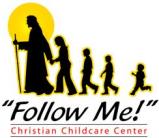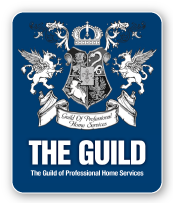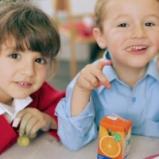

- Infant Program
- Ones/ Twos Programs
- Threes/ Preschool/ Pre-Kindergarten Programs
Our Programs
The structured "teaching" time at the center is typically during the morning hours, and will include a variety of appropriate activities for all ages, including infants. Teachers are responsible to develop an individual program for their class. Because of the nature of Christian child care, the education process will include Bible stories, Christian songs, and Bible activities. Programs typically include the following:
- Free Play: Children choose to play at the various learning centers that the staff has prepared. Examples are block building, games, art, dramatic play, library, discovery, sand/water, music/movement, cooking and outdoors.
- Circle Time: Children interact with the staff and each other as they discuss the calendar, weather, say the pledge, read stories, and sing.
- Large Group Time: The whole class takes part in a group game, experiment, cooking time, or other themed activity.
- Small Group Time: A small number of children at a time are invited to participate with staff in an activity specifically targeting developmental goals of the individual children in a class. This time might also be one-on-one with a teacher.
- Large Muscle Play: Children will play outside every day, unless there is inclement weather. When there is inclement weather, children will enjoy teacher-directed activities in our large indoor play area or our gymnasium.
Our Curriculum
We use “The Creative Curriculum” which shows teachers how to know and develop a positive relationship with each child, follow a consistent schedule, carry through on announced plans and promises, set up an environment where children can find and return materials on their own, provide appropriate play materials that support and challenge children’s abilities, help children express their feelings in constructive ways, provide appropriate real-world responsibilities and jobs, encourage children to see tasks through to completion, offer children opportunities to make choices, provide children with ample opportunities for creative expression, allow children freedom to explore the environment, permit children to get messy during play, encourage children to work independently, value children’s ideas, and promote problem-solving and appropriate risk-taking.
Programs Offered
Full Time Weekly Care
Weekly care for the supervision and nurturing of children ages six weeks through twelve years of age is offered. This program is available for infants through pre-schoolers (full-day), kindergartner, and school-age children (before/after school, summer camp, school holidays, and drop-in care).
Before/After School
School-aged children (K-12 years of age) are offered a program that includes a nutritious snack and a planned program of activities which provide a change of pace between school and home.
Summer Camp
Summer camp is offered for children during the regular summer season. Children completing kindergarten through the age of 12 are eligible to attend. Additional expenses for special activities and field trips are the responsibility of the parent and are included in the activity fee.
Part-Time
Part-time students will be accepted on a limited basis. Part-time at a minimum is 3 days. Part-time must give set days of attendance. If your set day falls on a holiday, you are still required to pay for that day as does our full-time students. We do not exchange or substitute days for any reason.
Child Care Network/Child Care Information Services: Accepted!
In cases where the ceiling rate (the amount CCN/CCIS/CAO pays) is less than the private rate (what “Follow Me!” charges), CCN/CCIS/CAO families will be expected to pay the difference included with their co-payment each week.
Programs Overview
Infant Program
In the infant room the teachers follow the individual schedule of each child, but include lots of one-on-one attention and play time with the children. The teachers read books to the infants, play on the floor with them, sing songs, and some simple art projects with children.
Ones/ Twos Programs
The Ones' and Twos’ schedules include time for snack, circle time, art, outside time, gross and motor play, lunch, nap, and free play. These classrooms use a lot of the same Learning Centers as the older children.
Threes/ Preschool/ Pre-Kindergarten Programs
These classrooms follow a daily schedule that includes outside and circle time, but the day uses a lot of free play time that the children spend playing in centers. The center/free play time is very important to the growth and development of the children. Each center actually helps the children develop skills in several areas including: social/emotional development, physical development, cognitive development and language development.
Classroom Learning Centers include:
- Blocks: When children create and build with blocks they are learning math skills. They learn the number of blocks to fill a certain area, height of towers and building geometric shapes, and weight and size when they lift and move blocks. They are making decisions about how to build and solve problems while they are building.
- Dramatic play: Pretending is so important to a child’s development. When they are pretending with others, they develop vocabulary, cooperative, and solve problems. Pretending and using real world props in their pretending helps increase their understanding of the world around them.
- Toys and Games: This center includes games and puzzles, table blocks, legos, and other small objects to manipulate. When children play in this center they are using and developing fine and small motor skills, using their imaginations, solving problems, and developing math concepts.
- Art: Art includes a wide variety of art materials and activities such as gluing, drawing, painting, pasting, molding and constructing. Children can express their own ideas, creativity and feelings, improve their fine motor skills and be proud of what they have made.
- Library: Library is important because is sets the beginning of reading and writing. The children can go to this area and relax and read some books.
- Discovery Area: The discovery area is the science area. The children do just what scientists do. They ask questions, conduct experiments, gather information, come up with an explanation and communicate their findings. They also study different areas of science including plants, magnets, animals, light, shadows, rainbows, senses, how things work and more.
- Sand and water: Children can experiment with sand and water developing math, reasoning and questioning skills, but they can also play in this area as a way to relax and enjoy the different textures.
- Music and movement: This area allows the children to express themselves through movement, but it also exposes the children to different types of music and allows them to develop an appreciation of different music.
 home
home
 contact
contact
 About Us
About Us
 Services
Services
 Centralpa Homemove
Centralpa Homemove


